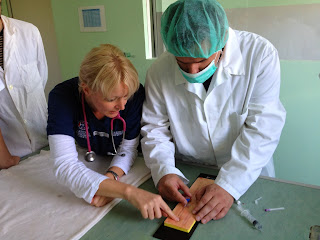Each
year, the Trustee’s of the respected international grant making charity the
Marchig Animal Welfare Trust, recognise through its top Award individuals or organisations
for their outstanding services to animal welfare. The Trustee’s are therefore pleased to
announce, that the recipient of the prestigious “Jeanne Marchig Animal Welfare
Award 2013” is Luke Gamble MRCVS, the Founder and CEO of the Worldwide Veterinary
Service, based in the UK.
Luke Gamble established the Worldwide Veterinary
Service (WVS) in 2003 to alleviate animal suffering and improve the
moral perception of animals worldwide by co-ordinating teams of veterinary volunteers
to assist the work of animal welfare organisations; supplying medicines,
equipment and advice where they are most needed; and providing sustainable
input, building long term relationships and establishing education programmes
for the benefit of local animal and human populations.
Since
its inception, WVS has sent many hundreds of volunteer ‘veterinary teams’ to almost
every continent of the world, including when required ‘Emergency Response
Teams’ to help the needy ‘front line’ animal welfare and protection
organisations alleviate the cruelty and suffering inflicted on animals in their
areas and thus enable them to cope better with the demands placed upon
them. WVS has also sent to these and
other organisations each year, hundreds of thousands of pounds of free
veterinary medicines, equipment and
materials which it had sourced from supportive veterinary companies.
Luke
Gamble through WVS, established
an International Training Centre (ITC) in India, which provides a platform for both vets in India and worldwide to
learn best practice techniques in areas such as humane stray animal population
control and vaccination programmes. In
addition, this year he spearheaded
a new initiative in India entitled ‘Mission Rabies’ which aims to undertake
mass anti-rabies vaccination programmes in ten ‘hotspots’ whilst at the same
time, running surgical training courses for local vets. The initial goal of
this project was to vaccinate 50,000 dogs against rabies in one month. However, instead with a team of Indian and
international vets, local charity workers and volunteers, incredibly over
61,000 dogs were vaccinated in just 28 days.
In announcing the 2013 winner of the Award, the Chairman of the Trustees, Les Ward commented:
“As in previous years, the Trustees of the Marchig Animal Welfare Trust received a large number of nominations for the Award from all over the world. With so many worthy candidates, the decision was not easy. Nevertheless, in the end the Trustees were unanimous that the “Jeanne Marchig Animal Welfare Award 2013” should be made to Luke Gamble, the Founder and CEO of the Worldwide Veterinary Service in recognition of his outstanding and tireless practical work over many years in the international field of animal welfare and protection. Under his voluntary direction, WVS has become one of the most effective international animal welfare and protection organisations. Through providing much needed support to other organisations throughout the world, WVS is making a huge difference in the fight to help, protect and alleviate the suffering of animals. Both Luke and WVS are worthy recipients of this Award”.
In
receiving the “Jeanne Marchig Animal Welfare Award 2013”, Luke Gamble said:
“It
is a huge honour to receive this award and I would like to thank the Trustees
very much. The Marchig Trust has long been a source
of inspiration to charities and individuals involved in animal welfare around
the world, and for WVS to be recognised in this way is a huge lift to both me
and the whole team. The pledge is to now direct this fantastic award towards
making a difference where it counts – on the front line of animal welfare,
championing the united ideals of both WVS and The Marchig Trust.”












.JPG)



























